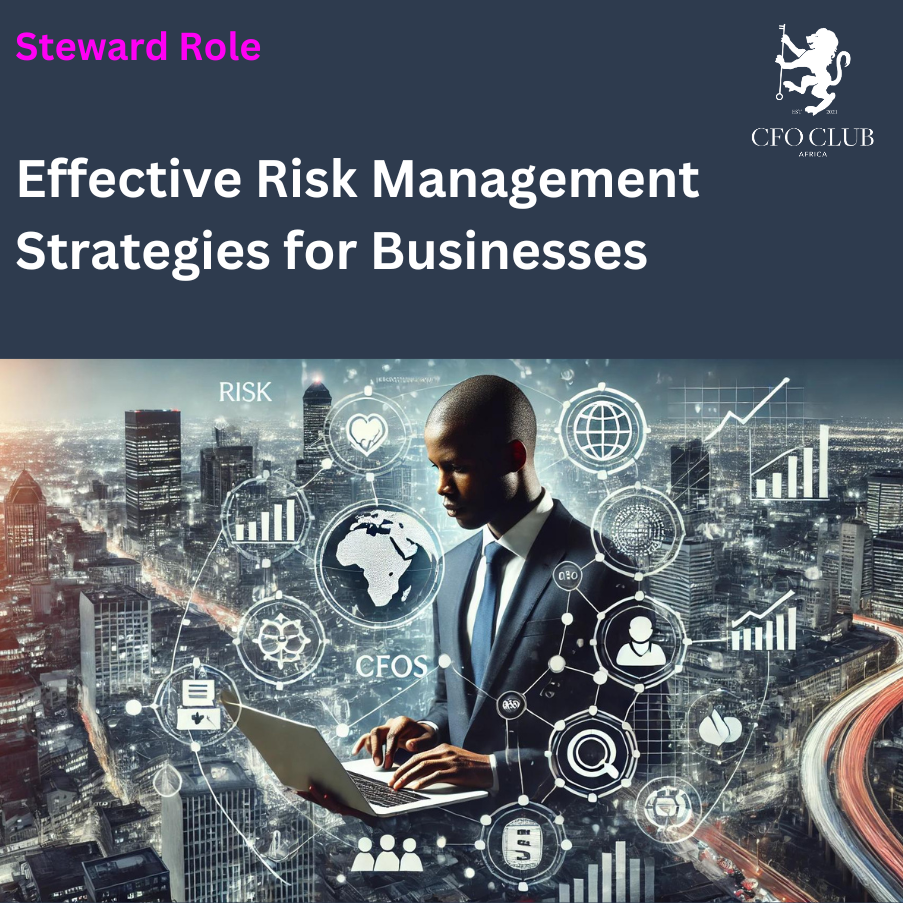As a CFO in today’s dynamic business landscape, you are no stranger to the multifaceted nature of risk. The ability to identify, assess, and manage risks effectively is critical to safeguarding your organization’s financial health and ensuring sustainable growth. For CFOs in Africa, particularly in South Africa, the challenges can be even more pronounced due to unique regional factors. This article aims to provide practical, actionable insights into effective risk management strategies that you can implement within your organization.
Understanding Risk Management in the CFO Role
Risk management is an integral part of the CFO’s stewardship role. As the financial guardian of the company, you are responsible for ensuring that risks are identified early, assessed accurately, and managed effectively. This involves not only financial risks but also operational, strategic, and reputational risks.
The Risk Management Process
- Risk Identification The first step in risk management is identifying potential risks that could impact the organization. This involves a thorough analysis of both internal and external factors. Internally, you might look at processes, systems, and personnel. Externally, consider market trends, regulatory changes, and economic conditions. For CFOs in South Africa, factors such as political instability, economic volatility, and regulatory changes are particularly pertinent.
- Risk Assessment Once risks are identified, the next step is to assess their potential impact and likelihood. This can be done using a risk matrix, which plots the severity of the impact against the likelihood of occurrence. The goal is to prioritize risks that have the highest potential impact on the organization. For example, currency fluctuations and credit risk may rank higher for South African businesses due to the economic environment.
- Risk Mitigation After assessing the risks, develop strategies to mitigate them. This could involve implementing new controls, transferring the risk (e.g., through insurance), or developing contingency plans. In the context of South African businesses, this might include diversifying revenue streams to mitigate economic risks or strengthening internal controls to prevent fraud.
- Risk Monitoring and Reporting Effective risk management is not a one-time activity but an ongoing process. Regular monitoring and reporting are essential to ensure that risks are being managed effectively and that new risks are identified promptly. This requires a robust risk management framework and regular communication with key stakeholders.
Key Strategies for Effective Risk Management
Develop a Risk-Aware Culture
Cultivating a risk-aware culture within your organization is crucial. This involves educating employees about the importance of risk management and encouraging them to report potential risks. As a CFO, led by example by integrating risk management into your daily activities and decision-making processes.
Leverage Technology
Technology can be a powerful ally in risk management. Advanced analytics, artificial intelligence, and machine learning can help you identify and assess risks more accurately and efficiently. Consider investing in risk management software that provides real-time insights and predictive analytics.
Diversify Revenue Streams
One of the most effective ways to mitigate financial risk is to diversify your revenue streams. This reduces dependence on a single market or product and spreads risk across multiple sources of income. For South African businesses, exploring opportunities in other African markets or globally can be a viable strategy.
Strengthen Internal Controls
Strong internal controls are essential for preventing fraud and ensuring compliance with regulations. Regularly review and update your internal controls to address emerging risks and ensure they are aligned with best practices. Conduct regular audits and provide training to employees to reinforce the importance of adhering to these controls.
Engage in Strategic Risk Management
Risk management should be integrated into your strategic planning process. This involves identifying risks that could impact your strategic objectives and developing plans to mitigate them. For instance, if entering a new market is part of your growth strategy, conduct a thorough risk assessment to identify potential challenges and develop strategies to address them.
Foster Strong Relationships with Stakeholders
Effective risk management requires collaboration with various stakeholders, including employees, customers, suppliers, and regulators. Foster strong relationships with these stakeholders to ensure open communication and collaboration in managing risks. This is particularly important in the African context, where relationships and networks can play a significant role in business success.
Stay Informed About Regulatory Changes
Regulatory compliance is a key aspect of risk management. Stay informed about changes in regulations that could impact on your business and ensure that your compliance programs are up to date. In South Africa, this includes staying abreast of developments related to the Companies Act, tax laws, and industry-specific regulations.
Develop a Contingency Plan
Despite your best efforts, some risks may still materialize. Having a robust contingency plan in place ensures that your organization can respond effectively to unexpected events. This includes having emergency procedures, crisis communication plans, and business continuity plans. Regularly test and update these plans to ensure they remain effective.
Conclusion
Effective risk management is a cornerstone of the CFO’s stewardship role. By adopting a proactive, strategic approach to risk management, you can safeguard your organization’s financial health and ensure sustainable growth. In the context of Africa, and specifically South Africa, this requires a nuanced understanding of the unique risks and challenges that businesses face. By developing a risk-aware culture, leveraging technology, diversifying revenue streams, strengthening internal controls, engaging in strategic risk management, fostering strong relationships with stakeholders, staying informed about regulatory changes, and developing robust contingency plans, you can navigate the complex risk landscape with confidence and resilience.
As CFOs, our role extends beyond financial oversight to being the custodians of our organizations’ long-term success. Embrace the challenge and turn risk management into a strategic advantage for your business

